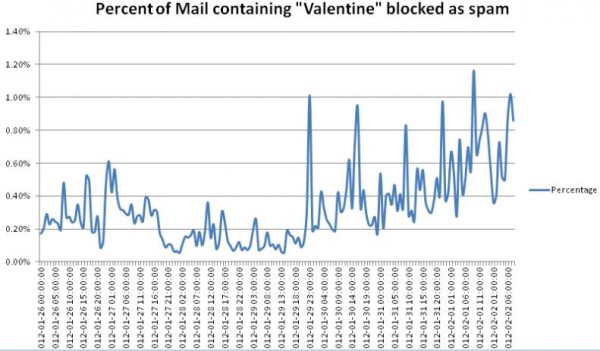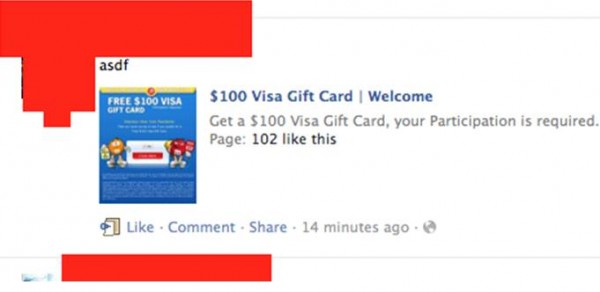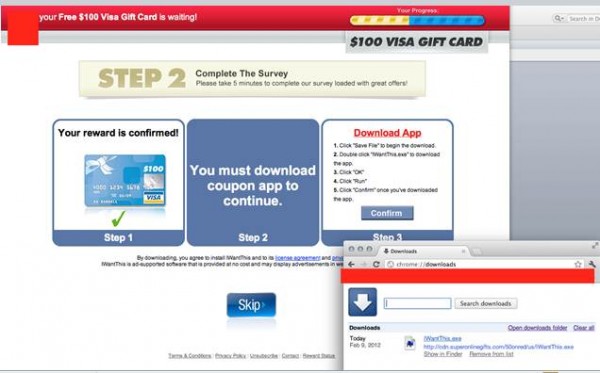![]()
McAfee cautions consumers to be wary of ‘fake’ Cupid this Valentine’s Day as depicted here:

” As we approach Valentine’s Day, McAfee expects messages with this holiday theme to quadruple, as seen in previous years of spam volumes. This is the way that hackers and scammers are taking advantage of our love for romance this month.
McAfee experts researched the latest scams and techniques cybercriminals are using this Valentine’s Day so that consumers can take care to avoid them. Some of the ways the bad guys are trying to break your heart and wallet include sending:
- Valentine’s Day deals that are too good to be true. These emails can be used to distribute malware and other viruses to consumers who unknowingly click on the images.



- Love Exploits that inspire you to open a friendly message that is laden with malware. It can come in the form of a link or attachment, such as a cute video or a Valentine’s Day theme for your social profile. Once downloaded, it stealthily installs malware on your computer.






- Another one to watch out for all year long are online dating scams. In a typical scam, the cybercriminal will create a fake online dating profile, complete with photos of an attractive ‘single,’ in an attempt to establish a relationship and gain your trust before attempting to collect your personal and financial details.”
PRESS RELEASE
February 10, 2012
Valentine’s Day Cyber Scams that Will Play with Your Heart
By Brenda Moretto
Back in November, McAfee warned consumers about the 12 scams of Christmas – tactics that cybercriminals used to take advantage of our holiday cheer and good spirit to steal our financial information or confidential data. From sending malware emails and setting up phony Facebook promotions and contests to conducting online coupon scams, there is no end to the amount of creativity invested into these holiday tricks, and Valentine’s Day is no different.
McAfee expects messages with a Valentine’s theme to quadruple globally as we approach the holiday, based on previous years of spam volumes. In other words, cybercriminals will be working hard to penetrate your defenses because they know you will be spending at least a little bit of time online looking for gift ideas, vacation suggestions, or e-cards.
Check out this list of Valentine’s scams to get an idea of how cybercriminals are exploiting this romantic holiday to steal your credit card details, install viruses on your personal computers and devices, and collect your personal information.
Valentine’s Day-themed spam
One type of bait that cybercriminals use to lure your financial information is through sending out holiday-themed emails that advertise items you may want to purchase. In regards to Valentine’s Day, you’ll often receive spam about deals on roses, chocolates, jewellery, etc. If you’re not careful, you could find yourself surfing a false website and purchasing products that you will never receive.
Tip: Never open emails from unfamiliar senders.
Malicious e-cards
Opening an e-card from an email address you don’t recognize is one of the easiest ways to invite malware onto your machine. For example, you may be prompted to download software to view the card, and while you may think you’re being re-directed to a legitimate site, you could actually end up installing a virus that could potentially steal your personal information.
Tip: Never click on a link in an e-card sent by someone you don’t know. Always check the address from which it was sent to ensure it came from a legitimate e-card website.
Online dating scams
Online dating sites are targeted by criminals looking to take advantage of users seeking love. The scenario usually follows a similar pattern: both parties establish an online relationship, and then the criminal concocts an appeal to the victim to send money, valuables, or personal information. It could be that the criminal wants money to make the trip out to visit the victim, or the criminal needs money to help a sick relative. Whatever the case may be, there is a good chance that once the money is sent, the victim will never hear from this person again.
Tip: Only use a reputable dating website and be wary of anyone who asks for personal information.
Unsafe searches and malicious malware
Searching for holiday-themed content, whether they be gifts or e-cards, poses significant security risks if a PC or device is not protected. McAfee has found that within the top 100 results of daily top search terms, nearly 50 per cent lead to malicious sites i. Whether prompted to download suspicious files or software, or encouraged to make a fake purchase, these sites are definitely up to no good.
Tip: Always use a safe search tool such as McAfee® SiteAdvisor® software, which tells you right in the search results page if a site is safe to click on. Shop from reputable sites and always remember that if an offer seems too good to be true, it probably is.
Rogue applications
Allowing applications to access your Facebook information potentially turn you into a spammer. These apps have a mind of their own and bombard your friends with myriad status updates and surveys to try to collect their personal data.
Tip: Be suspicious of applications and links, and think twice before allowing a third-party vendor to access your information.
——————————————-
i McAfee: McAfee Threats Report: First Quarter 2011. http://www.mcafee.com/us/resources/reports/rp-quarterly-threat-q1-2011.pdf. June, 2011.
—————————————
Happy Valentine’s Day!
You may also want to know:
